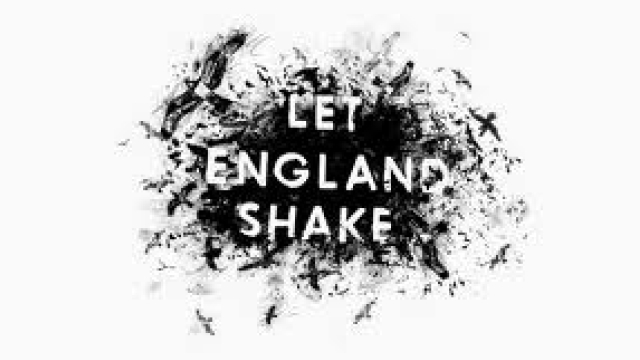The ghost that detailed her own suffering in White Chalk returns to narrate the destruction of the first Great War. Let England Shake, PJ Harvey’s most recent project (4 years ago; please come back sooner) is a creative culmination and peak of almost everything that has come before it, with the more minimal and folkish structures that made up her last two solo albums combined with the trademark literacy of pain and anguish we have come to expect. As a result this is the first album since Stories from the City; Stories from the Sea that matches Harvey’s artistic exploration with some genuine, honest to god tunes. No wonder both albums won the Mercury Award (the only artist to ever win it twice).
Like Stories From the City, both of these albums concentrate on a singular time and place, but use that to talk about themes universal and timeless. In Stories, New York was archetype for the city, and in Let England Shake, the campaign for Gallipoli rings through modern day combat and England’s unique combination of self-loathing and longing for times of Imperial power. “England’s dancing days are over,” Harvey exclaims on the title track, and it’s a sentiment that shows throughout the whole album.
Harvey says that this album came from the lyrics first, music second, and it shows. This album allows Harvey’s literacy shines though, unlike her other albums, almost every story on Let England Shake is in the third person, giving everything the aforementioned ghostly and timeless feel:
The scent of Thyme carried on the wind,
stings your face into remembering
cruel nature has won again.
Lyrics like this are almost Malickian in the way in which they depict the battles of man and the battles of nature together, as such Let England Shake does for the First World War what The Thin Red Line did for the second. But, like any artistic product, it is impossible to separate its artistic creation from the time that birthed it. The watery sounds coming from Harvey as she repeats “America” and “England” on “The Glorious Land” will make many people think of the country’s unified relationship ever since a certain incident ten years before this album (even more chilling when you consider that this is the song that brings up the imagery of deformed children). The album’s lead single, the battle cry of “The Words That Maketh Murder” makes this at its most explicit on the male backed “United Nations” outro.
But, as this an album, let’s talk about the music now. Sorry about that detour. For this project Harvey seems to have brought every one of her most consistent production collaborators (only missing Rob Ellis) along for this military like journey. Like her previous solo outing, PJ Harvey seems to takes an old genre idea, and update it with modern day techniques and sensibilities. With White Chalk it was Chamber Music, and here it is folk music (though folk rock is definitely a newer genre than its Victorian counter-part). From the first track and its immediate muted xylophone’s we are thrown into the sound of this album, almost unprepared.
The songs all make a cohesive whole, in turn making the “lesser” tracks huger due to the sum of all the part. But in comparison to Dry or White Chalk, each track focuses on an individual element of the production more, so as to make each song stand out in its own particular way. Whether that be the precise and ceremonial guitars on “The Last Living Rose”; the echoing pianos and voices of “Hanging On The Wire”; the loud marching percussion on “Bitter Branches” or the almost tropical sensation on one of the albums standout tracks: “On Battleship Hill.”
And speaking of instruments, Harvey’s voice just shines on here. Keeping to the high, thin end of her register as she has done with her last project, she still infuses it with a unique ethereal edge. Take songs like “Written on the Forehead,” and its cross between Kate Bush and the Regine Chassange led tracks on an Arcade Fire album, the latter comparison made even more apparent when you consider it contrast to the male vocals that act as the first person to Harvey’s third. The men of war on the ground compared to Harvey’s Mother Nature that floats everywhere on the record (just think how far her voice has come to the gruff howls of “Rid of Me”). This contrast just lets the final song, the organ filled climax “The Colour Of The Earth,” which is led by Mick Harvey’s vocals and complimented by Polly Jean, feel like the final choruses of war, and let the final lines complement nature and man as inseparable. The adhesive being war:
If I was asked I’d tell
The colour of the earth that day
It was dull and browny red
The colour of blood, I’d say
Let England Shake is every bit as complex as it is accessible. It is PJ Harvey showcasing both that which has matured in her and that which has always been great. The only reason I don’t place it at the number one of the pile immediately is because I have to give more time to it, to consider meticulously my thoughts on it in association with the rest of her consistent and brilliant. But hopefully by the time I have done that PJ Harvey will have released another album to make me think about it all over again, because this late period record is more than enough evidence that she has no reason to stop now…
What do you think, though?
PJ Harvey Album Rankings
- Is This Desire?
- Let England Shake
- To Bring You My Love
- Stories from the City, Stories from the Sea
- Rid of Me
- White Chalk
- Dry
- 4-Track Demos
- A Woman A Man Walked By
- Dance Hall at Louse Point
- Uh Huh Her

